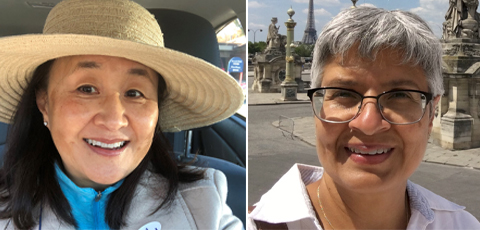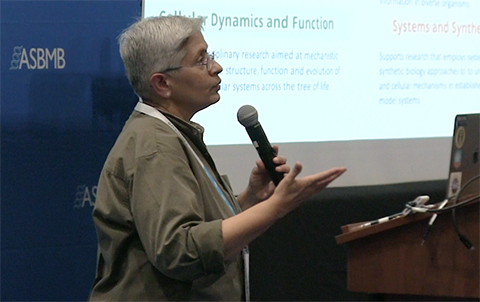
The inside scoop on NSF fellowships
ASBMB Today spoke with the National Science Foundation’s Jong-on Hahm, program director of graduate education, and Manju Hingorani, program director of molecular & cellular biosciences, about funding opportunities for graduate students and postdocs and how to make an application stand out.
The interview has been edited for length, clarity and style.

Q: Tell me about NSF funding opportunities for graduate students and who is eligible.
Hahm: For undergrad and graduate students, we have the NSF Graduate Research Fellowships Program (GRFP). It is one of NSF’s first programs and will turn 75 in a couple of years. The program is intended to recruit, recognize and support outstanding students who will make contributions to science, technology, engineering and mathematics or STEM education. We offer around 500 fellowships per year, but we receive up to 14,000 applications. It is very competitive. But, we strongly encourage students to apply because you just never know.
We like to joke at NSF that we have really strong FOMO (fear of missing out) on funding a great student. We don’t want to miss any possible great candidates. Please apply and don't take yourself out of the running. We don't want outstanding students missing out on funding because they don't know about the program. So, next year, we're going to significantly increase our outreach.
We really encourage undergraduate seniors to apply because that's when we would like to recruit them into science. Graduate students can apply as well if they are at the beginning of the first or second year of any graduate program. It is very important that they have not had more than one academic year in a graduate degree program of any kind, such as a master’s degree, Ph.D., M.D., etc.
Q: Is there any supplemental funding available to NSF GRFP awardees?
Hahm: Yes, we have very generous supplements for students who have already been awarded the NSF GRFP. The amount awarded for these supplements is up to $55,000. They are the Persons with Disabilities, Career–Life Balance and INTERN supplemental funding opportunities.
The Persons with Disabilities supplement is for those who might need a little more support in the lab to accomplish their research goals.
The Career–Life Balance supplement is for awardees that need to take time off of their work in the lab due to childbirth, caregiving, etc. This award allows the principal investigator to hire a technician to keep the student’s research going while they are away.
The INTERN supplement allows awardees to pursue a nonacademic internship for up to six months. Students with INTERN supplements are doing really cool things. For example, some are working at Google, museums, nonprofits and more. We don’t want people using this supplement to extend your fellowship.
It is important to note that it is the principal investigator who gets and applies for all supplemental awards.
Q: What advice do you have for students applying to the NSF GRFP?
Hahm: We strongly suggest that the applicants look over the application thoroughly, start early and practice. Don’t wait because there are a lot of fine details with the formatting that have to be just right.
Please be very careful and cautious with the kind of research that is eligible for support. Especially in biology, there are constraints. NSF does not support clinical or clinically relevant research. We've tried not to have a lot of overlap with the kind of research funded by the National Institutes of Health.
Remember, NSF and NIH are different agencies, and we have different goals that we're trying to reach. We often see a lot of applications that look like they are derived from an NIH grant from the student’s adviser. We do not want to see that. Follow the requirements to the letter and check out the FAQs and our webinars.

Hingorani: To provide a little bit more context, the clear red line for what is not eligible for funding is any clinical, clinically relevant, drug screening or drug-discovery project. But, there are gray zones as well. So, students must make a good justification for using what might be a disease model system for foundational research. The application must examine basic research questions. But, if for some reason you're working in a cancer cell line or disease model system, make sure that you can very strongly and clearly justify why you're working with that model disease to solve a fundamental scientific question.
Q: Tell me about NSF funding opportunities for postdoctoral fellows.
Hingorani: NSF offers Postdoctoral Research Fellowships in Biology, and the goal of these fellowships is to support independent research of recent Ph.D. graduates. We want to support their independent careers and make sure that the next generation is diverse in identity and research areas. The fellowships support both postdoctoral research and training.
The fellowships fall into three main competitive areas: Broadening Participation of Groups Underrepresented in Biology; Integrative Research Investigating the Rules of Life Governing Interactions Between Genomes, Environment and Phenotypes; and Plant Genome.
The first competitive area is focused on broadening participation in science. The goal of the proposal must be to increase the diversity in science, and the activities must be aimed at diversifying the scientists who participate in biology at the postdoctoral level.
The other two areas are focused on scientific research. The Integrative Research Investigating the Rules of Life Governing Interactions Between Genomes, Environment and Phenotypes competitive area examines complex, cross-disciplinary questions. These proposals should aim to create theories or models that have predictive capability and use computational, experimental and/or theoretical approaches. These projects often span biological hierarchical scales from molecules to ecosystems. The bottom line is: These are complex projects, not proposals looking at just one narrow question.
The third competitive area is through the Plant Genome Research Program. This area focuses on understanding the structure and function of plant genomes. A lot of these projects involve generating and integrating large-scale data to better understand and develop economically important plants or develop tools and technologies. They also often focus on economically important crops such as soybeans, rice, etc.
For the PRFB, there aren’t any specific supplemental funding opportunities. This is due to the fact that the fellowship is given directly to the fellow and does not pass through an institution. That said, the fellowship is pretty open when it comes to the fellow’s desired professional development and training. So, if there is an internship that they want built into their training with a company or government agency, that is certainly a possibility. There is a research allowance that comes with each fellowship in the amount of $20,000, and this research allowance can be used to support such training and professional development.
Applicants can submit only one fellowship application per fiscal year and may apply in no more than two successive years for all postdoctoral fellowships.
Q: What advice do you have for postdocs applying for these fellowships?
Hingorani: For postdoctoral programs, you can communicate with the program directors who are listed as points of contact with the program by email. Make sure your application asks important questions that are relevant to the Biological Sciences Directorate.
The goal of these fellowships is to allow postdocs to have independence. So, you really have to seize that opportunity and propose some very exciting, novel research. Don't be afraid of asking complex questions and let your excitement show in these applications.
Enjoy reading ASBMB Today?
Become a member to receive the print edition four times a year and the digital edition monthly.
Learn moreGet the latest from ASBMB Today
Enter your email address, and we’ll send you a weekly email with recent articles, interviews and more.
Latest in Education
Education highlights or most popular articles

Embrace your neurodivergence and flourish in college
This guide offers practical advice on setting yourself up for success — learn how to leverage campus resources, work with professors and embrace your strengths.

Survival tools for a neurodivergent brain in academia
Working in academia is hard, and being neurodivergent makes it harder. Here are a few tools that may help, from a Ph.D. student with ADHD.

Quieting the static: Building inclusive STEM classrooms
Christin Monroe, an assistant professor of chemistry at Landmark College, offers practical tips to help educators make their classrooms more accessible to neurodivergent scientists.

Hidden strengths of an autistic scientist
Navigating the world of scientific research as an autistic scientist comes with unique challenges —microaggressions, communication hurdles and the constant pressure to conform to social norms, postbaccalaureate student Taylor Stolberg writes.

Women’s History Month: Educating and inspiring generations
Through early classroom experiences, undergraduate education and advanced research training, women leaders are shaping a more inclusive and supportive scientific community.

Summer internships in an unpredictable funding environment
With the National Institutes of Health and other institutions canceling summer programs, many students are left scrambling for alternatives. If your program has been canceled or delayed, consider applying for other opportunities or taking a course.

